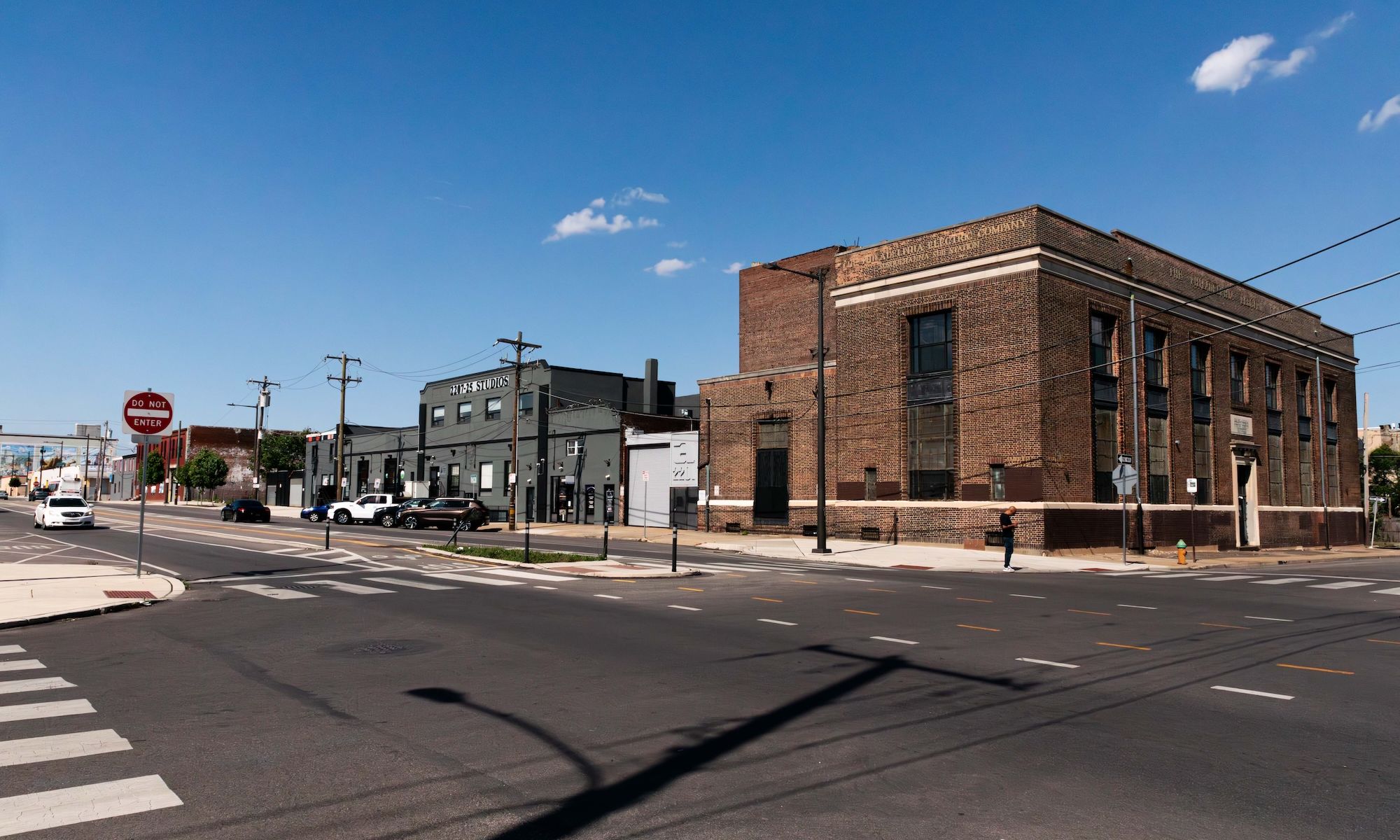The future site of the Forman Arts Initiative's first permanent space, with the former electrical substation on the corner Photo: Isabel Kokko, courtesy the Forman Arts Initiative, Philadelphia
Last week, Philadelphia’s Forman Arts Initiative (FAI) announced that it has bought and is developing almost a whole block in the city’s West Kensington neighbourhood as a museum and community centre—with help from the artist Theaster Gates and local architects Digsau and Ian Smith Design Group. The campus will open in stages over the next two years, starting later this summer with a public outdoor space.
FAI was founded in 2021 by the Philadelphia-based investment banker Michael Forman and his wife, Jennifer Rice, with the artist Rashid Johnson as one of its board members. It provides grants to Philadelphia artists and arts organisations, including a couple in Kensington—a majority Latinx and Black working-class area that has recently been portrayed as an epicentre of the opioid epidemic. In the neighbourhood, FAI has funded the Norris Square Neighborhood Project, a network of public gardens, and Taller Puertorriqueño, a community centre for Puerto Rican arts and culture.
At a launch event on 30 May, Forman, Rice and the new FAI executive director Adjoa Jones de Almeida (formerly director of learning and social impact at the Brooklyn Museum) showed off the four buildings and vacant lot that will comprise the campus—an entire city block, save a church on the corner of North American and West Dauphin streets. The structures include an old retail and office building, a former foundry and a former electrical substation. The last of these recently served as an event space, which Forman and Rice said they fell in love with after hosting their daughter’s bat mitzvah there a couple years ago. The couple bought the half-acre lot and buildings totalling 100,000 sq. ft for $13.5m.
Inside the former electrical substation as it appears today Photo: Isabel Kokko, courtesy the Forman Arts Initiative, Philadelphia
Forman and Rice intend to use the campus both to house their extensive art collection of more than 800 works—including pieces by Gates, Johnson, Romare Bearden, Mark Bradford, Cecily Brown, Sam Gilliam, Roberto Lugo, Kerry James Marshall, Joan Mitchell, Gordon Parks, Adam Pendleton, Gerhard Richter, Cindy Sherman, Lorna Simpson and Alma Thomas—and as an arts centre and community space created in conjunction with the needs of the neighbourhood.
During the launch event, Forman noted that he was inspired by Gates’s Dorchester Projects on Chicago’s South Side, which transformed a dilapidated block in a Black working-class neighbourhood into a cultural and community hub. “Hopefully, we can do the same thing here,” Forman said. Gates will work with Jones de Almeida to help steer the “renovation and activation” of the campus as well as events and partnerships in the neighbourhood and beyond. (FAI also helped fund Gates’s 2022 project Monument in Waiting on the campus of Philadelphia’s Drexel University.)
As for housing FAI’s “permanent collection”, Forman and Rice hope to have the museum ready to open to the public by 2026—to coincide with the 250th anniversary of the signing of the US’s Declaration of Independence, which took place in Philadelphia. “We think of our collecting more as stewardship than ownership,” Rice said at the event.
The half-acre lot and future public outdoor space Photo: Isabel Kokko, courtesy the Forman Arts Initiative, Philadelphia
“Anytime you have these mega-anniversaries, it’s an opportunity for dialogue,” Jones de Almeida said, noting the importance of bringing in historically marginalised voices and previously suppressed stories. As for exactly what the community-space part of the FAI project will be, “we don’t know”, she said. “But we don’t know on purpose. It’s a very intentional choice.”
The goal is to talk to members of the community to find out what people want and need and decide the future of the spaces along with them. Potential collaborators include the artist Pedro Ospina, who runs the Open Kitchen Sculpture Garden across the street from FAI’s new campus, and the Clay Studio’s Claymobile, a pop-up that brings clay, potter’s wheels and ceramics classes to neighbourhoods all around Philadelphia.
During a conversation as part of the FAI launch event, the ceramicist Roberto Lugo, a native of Kensington who has worked with the Clay Studio and Claymobile, said that it is a “constant struggle to wield whatever power I’ve been given to help my community” and that he hopes the new FAI initiatives will give him and other artists that chance. “In every culture and community, there are artists and poets, but a lot of them never get the opportunity to do that,” he said, noting that he took his very first pottery class at age 27. “The ability to create things is power.”

